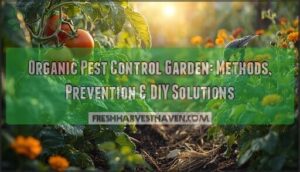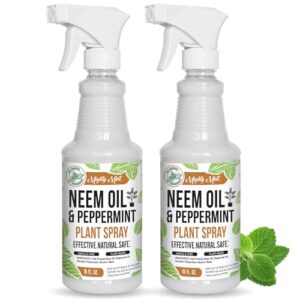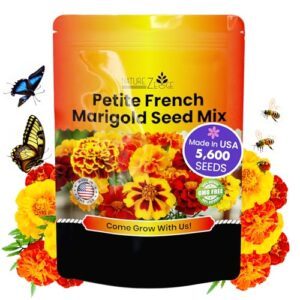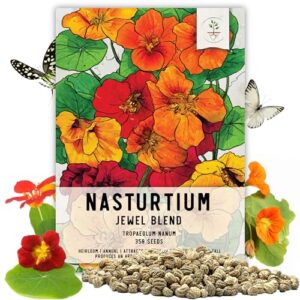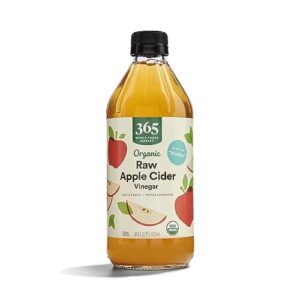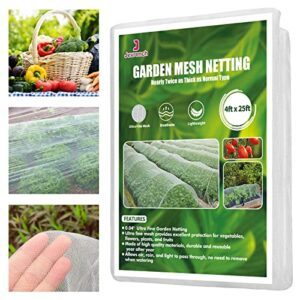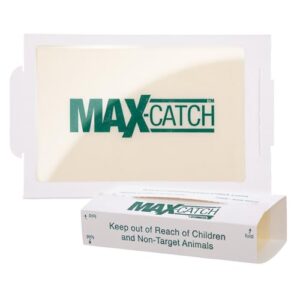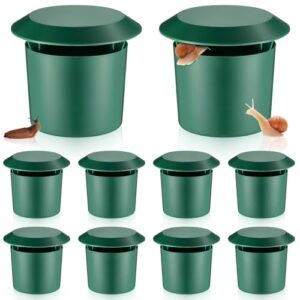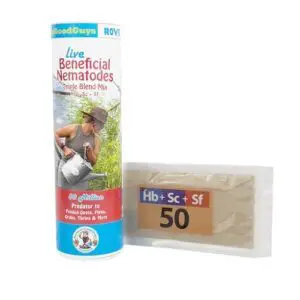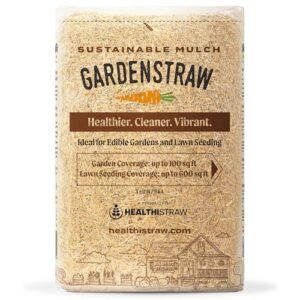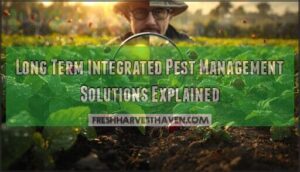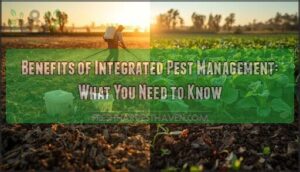This site is supported by our readers. We may earn a commission, at no cost to you, if you purchase through links.
Every gardener knows the sinking feeling of spotting chewed leaves or a trail of aphids where healthy greens should be. It’s not just about losing a tomato or two—pests can unravel months of hard work in a matter of days.
But here’s the good news: organic pest control garden strategies don’t rely on harsh chemicals or risky shortcuts. Instead, they utilize nature’s own defenders, from ladybugs to clever planting techniques, to keep your harvest safe.
If you’re ready to reclaim control and make your garden a safer haven for both plants and people, there’s a toolkit of proven solutions waiting for you.
Table Of Contents
- Essential Organic Pest Control Methods
- Preventing Garden Pests Organically
- Creating a Healthy Garden Ecosystem
- Natural Pest Repellents and DIY Solutions
- Top 10 Organic Pest Control Products
- 1. Mighty Mint Neem Plant Nutrient Spray
- 2. NatureZ Edge Marigold Seeds Mix
- 3. Jewel Mix Nasturtium Edible Flower Seeds
- 4. Organic Raw Apple Cider Vinegar
- 5. Mezzetta Hot Chili Peppers 16 Ounce
- 6. Garden Plant Protection Netting Cover
- 7. Catchmaster Max Catch Glue Traps
- 8. Beer Slug Snail Trap Catcher
- 9. Natures Good Guys Triple Blend Nematodes
- 10. HealthiStraw Garden Straw Mulch
- Frequently Asked Questions (FAQs)
- What is the best organic pesticide for gardens?
- What are natural pest repellents for gardens?
- What do organic farmers use to keep pests away?
- How do you control insects in an organic garden?
- What is the best natural pesticide for gardens?
- What do organic farmers use for pest control?
- How to get rid of garden pests without pesticides?
- How do I keep bugs out of my garden naturally?
- How do I keep pests out of my garden naturally?
- What is the best organic pesticide for vegetables?
- Conclusion
Essential Organic Pest Control Methods
You don’t need to rely on harsh chemicals to protect your garden from pests. Organic methods work with nature, keeping your plants healthy while safeguarding beneficial insects and pollinators.
Let’s look at the most effective organic pest control strategies you can start using today.
Natural Insecticides and Repellents
While synthetic pesticides may promise fast results, natural insecticides and repellents offer safer alternatives for your garden. Neem oil, insecticidal soap, and garlic spray effectively target soft-bodied pests with minimal environmental impact. Essential oils like peppermint and citronella repel unwanted visitors, while diatomaceous earth controls crawling insects.
Researchers have found that essential oils control many small-bodied pests effectively. Though botanical efficacy may require patience and resistance patterns can develop, these plant-based repellents maintain greater safety metrics for your family and beneficial insects alike.
Beneficial Insects and Organisms
Beyond sprays and oils, you can recruit living allies to patrol your garden. Ladybugs devour up to 50 aphids daily, while lacewing larvae eliminate nearly 200 soft-bodied pests during their development. These beneficial insects form your frontline defense.
Consider welcoming these natural predators into your beneficial insect habitat:
- Parasitic wasps reduce aphid populations by 65% through targeted pest suppression
- Beneficial nematodes control over 200 soil-dwelling pests like grubs and root weevils
- Earthworms accelerate organic matter breakdown, supporting healthier soil ecosystems
- Bacillus thuringiensis (Bt) bacteria eliminate up to 80% of caterpillar larvae
- Entomopathogenic fungi infection kills 60% of targeted insects within two weeks
Building beneficial insect populations requires patience, but nematode control and fungi application offer lasting protection without toxic residues. Many gardeners attract these helpers by planting native flowers, which provide food for adult wasps. Plant native flowers to attract these helpers, and watch your earthworm population strengthen soil resilience against root pathogens.
Physical Barriers and Garden Netting
While beneficial insects provide lasting defense, physical barriers offer instant protection. Garden netting and row covers block up to 90% of flying pests when edges are sealed properly.
Install exclusion methods like spun-bonded polypropylene in early spring—timing matters since April through September aligns with peak infestations. You’ll need to lift netting types temporarily for pollinator access during bloom.
Though barrier installation costs $1 per square foot, you’ll see returns through pest prevention worth $2,204 annually on small plots.
Handpicking and Trapping Pests
When physical barriers aren’t enough, handpicking and trapping work hand-in-hand. You’ll achieve an 87% success rate removing slugs and large insects manually—best during early mornings when pests are active.
Trap effectiveness shines with these proven options:
- Yellow sticky traps reduce flying insects by 71%
- Beer traps attract slugs overnight
- Pheromone traps cut beetle populations 90%
- Delta traps capture moths effectively
Combined methods boost pest suppression 26% over single approaches, though handpicking timing requires 4–8 hours weekly during peak season.
Preventing Garden Pests Organically
The best defense against garden pests isn’t spraying after they arrive—it’s stopping them before they get a foothold. You can dramatically reduce pest problems by making smart choices about what you plant, where you plant it, and when you harvest.
Let’s look at four prevention strategies that’ll keep your garden healthier with far less effort than fighting infestations later.
Crop Rotation Strategies
You can cut pest populations dramatically just by moving your crops around each year. Crop rotation disrupts the life cycles of garden pests that depend on specific host plants, reducing infestations by up to 80%.
Plan a 3–4 year cycle, grouping vegetables by family and rotating them through different beds. This simple technique improves soil health while keeping pests guessing.
Selecting Pest-resistant Plants
Plant varieties with built-in resistance mechanisms—like thick leaves or pest-repelling compounds—give you a strong first line of defense. Breeding considerations and local adaptation matter: hosta cultivars such as ‘Halcyon’ resist slugs, while nematode-resistant tomatoes can cut pesticide costs by 16 cents per unit.
Smart species selection protects plant health, reduces pest damage, and delivers real economic benefits without extra sprays.
Companion Planting for Pest Control
Strategic companion planting offers you natural pest control that’s both effective and rewarding. Pairing marigolds with tomatoes reduces nematodes through allelopathic compounds, while nasturtiums trap aphids away from cabbage.
These organic pest control methods can slash pest populations by 25% to 40% and boost crop yields by up to 32%. Attracting beneficials like ladybugs through dill increases predator presence by 15%, suppressing garden pests naturally while optimizing garden layouts for healthier harvests.
Timely Planting and Harvesting
Timing your planting and harvest schedules transforms pest management into a powerful preventive tool. Research proves early sowing can cut aphid infestations by 25% during vulnerable growth stages, while strategic timing reduces pest exposure by up to 18%.
For maximum harvest pest reduction and economic yield impacts, follow these planting strategies:
- Sow early to avoid peak pest populations and synchronized life cycles
- Harvest early to limit damage and reduce crop loss by up to 40%
- Rotate crops and adjust your seasonal pest management schedule yearly
Creating a Healthy Garden Ecosystem
A thriving garden isn’t just about keeping pests away—it’s about building a balanced ecosystem. When you focus on creating a space where beneficial creatures naturally keep problems in check, you’re setting up a living defense system that works around the clock.
A truly thriving garden is built by creating a balanced ecosystem where beneficial creatures form a natural, nonstop defense against pests
Let’s look at four key ways to build this natural balance in your garden.
Encouraging Beneficial Insects and Pollinators
Your garden can become a thriving hub for beneficial insects and pollinators when you prioritize floral diversity and habitat creation. Plant a variety of flowering species year-round—gardens provide 85% of urban nectar resources.
Reducing pesticides is critical; high use cuts wild bee populations by up to 43%. By creating a healthy ecosystem rich in biodiversity, you’ll naturally attract the predators that keep pests in check.
Maintaining Soil Health and Biodiversity
Healthy soil is the backbone of your garden’s defense system. Organic matter levels in healthy gardens average 6.3%—nearly double that of conventional plots—creating a thriving microbial community that strengthens plants from the ground up.
Here’s what soil biodiversity brings to your ecosystem:
- Enhanced water-holding capacity helps plants withstand drought stress and resist pest damage
- Composting amendments introduce beneficial organisms that naturally suppress disease and pest populations
- Rich microbial function unlocks nutrients and builds soil structure, making your plants naturally more resilient
Soil enrichment through organic practices creates the foundation for a garden that practically defends itself.
Providing Habitat for Natural Predators
Your strongest allies in pest control need places to live. Gardens with high vegetation cover support 45% more predatory insects than sparse plantings. Native plants attract natural predators like ladybugs and lacewings at rates 50% higher than non-natives.
Add shelter options like brush piles, insect hotels, and water sources—birdbaths increase predatory visits by 29%. This habitat complexity transforms your garden ecosystem into a self-regulating system where biodiversity works for you.
Managing Weeds and Garden Hygiene
Weeds compete directly with your crops and shelter pests. Organic weed control starts with identification—knowing your annuals from perennials shapes your approach.
Tillage and regular hand-weeding reduce seedbank buildup, while organic mulch application limits bare ground where weeds thrive.
Clean your tools between garden beds to prevent spread. This garden maintenance protects soil health and strengthens overall garden health naturally.
Natural Pest Repellents and DIY Solutions
You don’t need to spend a fortune on commercial products to keep pests at bay. Your kitchen and garden shed likely hold everything you need to create effective, natural pest repellents.
Let’s explore some simple DIY solutions that work just as well as store-bought options while keeping your garden chemical-free.
Essential Oils and Herbal Remedies
With essential oils and herbal remedies, you can boost pest repellency without risking garden compatibility. Oil effectiveness, like peppermint oil and cinnamon, rivals synthetic options while herbal safety keeps your produce clean. DIY sprays made from herbs that deter common pests offer homemade organic pest control solutions you can trust.
- Peppermint oil
- Cinnamon oil
- Thyme oil
- Rosemary extract
- Marjoram oil
Homemade Garlic and Hot Pepper Sprays
While herbal oils create a safe barrier, homemade garlic and hot pepper sprays add another layer of organic pest repellents. Spray efficacy improves with proper application timing, especially early mornings.
A simple recipe variation—garlic, water, and just a touch of soap—offers broad protection. Consistent use boosts crop impact while safeguarding beneficial insects, making these organic sprays practical for home gardeners.
Using Diatomaceous Earth and Neem Oil
For organic pest control that balances environmental impact and effectiveness, try pairing diatomaceous earth and neem oil. Their combined efficacy addresses garden pests across life stages: DE targets crawling insects with physical action, while neem oil disrupts pest development.
Follow application methods closely, use food-grade DE, and protect pollinators—these safety precautions help you control pests without harming your organic garden.
Organic Mulch and Soil Amendments
Between rows of tomatoes or around young seedlings, blanket your soil with organic mulch—it’s more than a weed barrier. Mulch pest control stifles unwanted bugs, aids arthropod diversity, and boosts soil health. Pair that with thoughtful soil amendments, such as compost or biochar, for lasting pest resistance and fertile, balanced earth.
- Mixed living mulch suppressing beetles
- Biochar improving root zones for pest suppression
- Pine bark enhancing predator insect populations
- Compost cutting nematode numbers
Top 10 Organic Pest Control Products
If you want to keep pests in check without harsh chemicals, the right organic products can make all the difference. From natural sprays to clever traps, there are options for every type of garden.
Here are ten of the most trusted solutions to help you grow a healthier, safer space.
1. Mighty Mint Neem Plant Nutrient Spray
Ever wondered if a single spray could tackle gnats, mites, and aphids without harsh chemicals? Mighty Mint Neem Plant Nutrient Spray blends Neem oil benefits with peppermint oil uses, offering an invigorating, plant-safe solution for organic pest control.
You’ll find its application frequency—every two weeks—practical for busy gardeners. Customer satisfaction runs high, with most users seeing pest control efficacy within days.
Unlike homemade sprays, this ready-to-use formula leaves leaves shiny, promotes plant health, and won’t harm pollinators or pets.
Best For: Home gardeners and plant lovers looking for an easy, natural way to boost plant health and control common pests without harsh chemicals.
- Fast-acting against gnats, mites, and aphids, with visible results in 2–3 days
- Safe for kids, pets, pollinators, and organic gardens
- Leaves plants looking vibrant and shiny, with a pleasant minty scent
- Mixed reviews on effectiveness for severe pest infestations
- Can be pricey compared to DIY or chemical alternatives
- May require regular reapplication to maintain results
2. NatureZ Edge Marigold Seeds Mix
Looking for a pest repellent that doubles as a garden showpiece? NatureZ Edge Marigold Seeds Mix stands out for its vibrant blooms and impressive pest deterrent power.
Companion planting with marigolds has proven to slow pest population growth, attract beneficial insects, and reduce nematode issues—real wins for organic pest control.
With over 5,600 GMO-free seeds per pack, you’ll cover borders and beds with natural pest repellents. User experiences highlight quick germination, strong biological impact, and healthier gardens, making this mix a practical choice.
Best For: Gardeners who want natural pest control and vibrant, easy-to-grow flowers for borders, beds, or containers.
- High seed count covers large areas and offers great value.
- Attracts beneficial insects while reducing common garden pests.
- Quick germination and low-maintenance, suitable for all skill levels.
- Needs full sun and moderate watering to thrive.
- Can be prone to root rot in extreme weather.
- Occasional mix-ups with seed varieties reported by users.
3. Jewel Mix Nasturtium Edible Flower Seeds
Why settle for a flower that’s just pretty when you can plant Jewel Mix Nasturtium and outsmart garden pests at the same time? This compact, edible powerhouse confuses aphids and beetles with its spicy scent, acting as a natural pest deterrent.
Its vibrant blooms attract pollinators and beneficial insects, boosting companion planting success. Easy growth habits and edible value make it practical for any gardener.
Plus, the economic benefits—fewer chemical sprays and continuous color—mean your garden thrives with less effort.
Best For: Gardeners who want vibrant, edible flowers that naturally repel pests and attract pollinators for healthier, low-maintenance gardens.
- Edible flowers and leaves add color and a peppery flavor to dishes.
- Naturally deters common garden pests and attracts beneficial insects.
- Easy to grow and maintain, even for beginners.
- May not bloom well in extreme temperatures or frost-prone areas.
- Needs consistent moisture and well-draining soil to thrive.
- Some users report variable germination rates from seed packets.
4. Organic Raw Apple Cider Vinegar
Did you know apple cider vinegar (ACV) isn’t just for salads? In organic gardening, this ACV Pest Repellent works wonders against aphids, ants, and fruit flies. Diluted sprays help with Fungal Disease Prevention, while ACV traps boost pest control methods by doubling fly captures.
Use it as a Garden Tool Disinfectant or a Soil Acidity Amendment for acid-loving plants. ACV’s versatility makes it a practical, natural pest control method—just remember, frequent reapplication is key for lasting protection.
Best For: Home gardeners and organic enthusiasts looking for a natural, multi-purpose solution for pest control, soil care, and kitchen use.
- Effective at repelling aphids, ants, and fruit flies in small gardens
- Safe for organic gardening and tool cleaning without harsh chemicals
- Doubles as a salad ingredient, marinade, and natural remedy
- Needs frequent reapplication for ongoing pest control
- Can damage plants if used undiluted or too often
- Some users report leaking bottles and lack of pour spout
5. Mezzetta Hot Chili Peppers 16 Ounce
If apple cider vinegar is your go-to for fruit flies, Mezzetta Hot Chili Peppers offer a punchy twist for pest control. Capsaicin Pest Control is simple: whip up a Pepper Spray DIY using these bite-sized peppers for natural pest deterrents against aphids and beetles.
It’s a true Culinary Pest Repellent—safe for plants, potent for pests, and handy in the kitchen. Plus, pepper health benefits mean you’re adding nutrition, not just heat. Think of it as an organic alternative that works double duty.
Best For: Spice lovers, home cooks, and anyone who wants a flavorful kick in their meals or a natural way to deter garden pests.
- Adds balanced heat and bold flavor to a wide range of dishes.
- Versatile—works in recipes, as a topping, or for homemade pest control sprays.
- Gluten-free, kosher, and packed in glass jars for freshness.
- May be too spicy for those who prefer mild flavors.
- Contains sodium bisulfite, which some people may wish to avoid.
- Price is a bit higher compared to other jarred peppers.
6. Garden Plant Protection Netting Cover
Regarding garden pest management, a Garden Plant Protection Netting Cover stands out as a reliable Pest Barrier. Unlike sprays or powders, these Garden Covers use ultra-fine Netting Materials to physically block insects, birds, and even curious cats.
You’ll find crop protection goes up—yield and quality both improve. Row covers and floating row covers are easy to install; just anchor them well to keep wind from sneaking under.
For gardeners who value control and safety, netting installation is a smart, low-impact pest control method.
Best For: Home gardeners and small-scale growers who want a reusable, chemical-free way to protect their vegetables, fruits, and flowers from pests.
- Blocks insects, birds, and animals without using pesticides.
- Allows sunlight, air, and water through for healthy plant growth.
- Durable and reusable for multiple growing seasons.
- Needs secure anchoring to prevent wind from lifting or blowing it away.
- Can be hard to see through in bright sunlight.
- May rip or fray if not handled carefully or if extra support is added.
7. Catchmaster Max Catch Glue Traps
After netting protects your crops, Catchmaster Max Catch Glue Traps step in for indoor pest control. These Sticky Traps use sophisticated Adhesive Technology, offering pesticide-free Pest Control Strategies that target mice, roaches, ants, and spiders.
Their year-round effectiveness and mess-free design make them a practical choice for homes with children or pets. For best results, place traps along walls or under sinks—areas pests frequent.
While highly effective, Humane Considerations matter; check traps daily and avoid placing them where non-target species might get stuck.
Best For: People who want simple, pesticide-free pest control indoors, especially in homes with kids or pets.
- Easy to use and doesn’t require bait or chemicals.
- Works year-round for a wide range of pests, from mice to insects.
- Safe for homes with children and pets since it’s non-toxic.
- May not work well in humid or dusty areas—the glue can lose stickiness.
- Can be tough emotionally if you catch rodents or other animals.
- Needs careful placement to avoid trapping non-target creatures.
8. Beer Slug Snail Trap Catcher
If you’re tired of slugs chewing through your lettuce, a Beer Slug Snail Trap Catcher is a straightforward organic pest control tool. Slug Trap Efficacy is proven—beer traps can capture hundreds of slugs in a season, especially when placed near vulnerable plants.
For DIY solutions, use beer or yeast as bait, but try sugar or bread dough for Beer Bait Alternatives.
Smart Trap Placement Strategies and regular Organic Pest Monitoring help you spot Slug Behavior Patterns and protect your garden naturally.
Best For: Gardeners and farmers looking for an easy, chemical-free way to control slugs and snails around their plants.
- Safe for pets, kids, and wildlife—no toxic chemicals.
- Proven to reduce slug and snail damage in gardens.
- Reusable traps offer long-term, low-cost pest control.
- Traps need regular checking and refilling to stay effective.
- Some slugs may avoid entering the trap or only crawl on it.
- May attract raccoons or possums to the bait, causing disturbances.
9. Natures Good Guys Triple Blend Nematodes
Nematode Application is a breakthrough for organic pest control, especially when you’re battling soil pests. Nature’s Good Guys Triple Blend Nematodes deliver Pest Control Effectiveness against grubs, fungus gnats, and beetle larvae.
These beneficial nematodes thrive when Soil Temperature stays above 53°F. Proper Nematode Storage in the fridge keeps them active until use.
As a Biological Pest solution, they work alongside other Natural pest control methods like Diatomaceous earth and Beneficial insects, giving you a safe, eco-friendly edge in your garden.
Best For: Gardeners and pet owners who want a safe, natural way to control soil pests without using chemicals.
- Safe for pets, kids, and plants—no harsh chemicals or toxic residues.
- Controls over 200 types of soil pests, including fungus gnats, grubs, and beetle larvae.
- Easy to apply indoors or outdoors with a watering can or sprayer.
- Results aren’t instant; it can take several days to weeks to see full pest reduction.
- Requires moist soil and temperatures above 53°F for best results.
- Nematodes must be stored properly and used quickly, or they may lose effectiveness.
10. HealthiStraw Garden Straw Mulch
Straw mulch is a quiet hero in organic gardening, and HealthiStraw Garden Straw Mulch proves its worth. By locking in soil moisture and suppressing weeds, you cut watering needs and spend less time battling garden pests.
Its clean, non-GMO wheat straw promotes soil health, aids disease prevention, and makes preventive maintenance easier.
For natural pest management, this mulch stabilizes temperature, reduces soil splash, and creates an environment where beneficial organisms thrive—a simple, effective step in your soil management toolkit.
Best For: Gardeners who want an easy, eco-friendly way to improve soil health, cut down on watering, and keep weeds in check in vegetable gardens, raised beds, and containers.
- Conserves water by reducing watering needs up to 50%
- Suppresses weeds and stabilizes soil temperature for healthier plants
- Clean, non-GMO, and free from chemicals—safe for organic gardening
- May contain some wheat seeds, leading to possible grass seedlings
- Can occasionally grow fungus, requiring extra monitoring
- Coverage may not match package claims, especially for larger areas
Frequently Asked Questions (FAQs)
What is the best organic pesticide for gardens?
Think of Neem oil as the Swiss Army knife of organic pest control—effective against over 200 garden insects.
Pair it with Spinosad, BT options, Pyrethrin safety, Diatomaceous earth, insecticidal soap, and garlic spray for best results.
What are natural pest repellents for gardens?
Natural pest repellents for gardens include essential oil blends like citronella and peppermint, garlic pepper sprays, diatomaceous earth, herbal organic mulches, and homemade natural sprays.
Companion planting and attracting beneficial insects also boost organic pest control effectiveness.
What do organic farmers use to keep pests away?
Organic farmers rely on natural insecticides like neem oil, beneficial insects such as ladybugs, physical barriers, crop rotation, and homemade repellents.
Techniques like Diatomaceous Earth and companion planting are key organic pest control methods in sustainable gardening.
How do you control insects in an organic garden?
As the saying goes, “An ounce of prevention is worth a pound of cure.” You’ll control insects best with organic pest control methods—using neem oil, Diatomaceous Earth, companion planting, beneficial insects, and eco-friendly gardening for sustainable pest prevention.
What is the best natural pesticide for gardens?
Neem oil stands out for its broad-spectrum effectiveness, disrupting pest growth while sparing beneficial insects.
Combine Neem Oil Benefits with Organic Sprays like garlic spray, Diatomaceous Earth, and insecticidal soap for reliable, eco-friendly garden remedies and Natural Insecticides.
What do organic farmers use for pest control?
If you think organic farmers just whisper sweet nothings to their tomatoes, think again. They rely on Organic Sprays, Pest Traps, Natural Repellents, Soil Amendments, Biological Controls, Beneficial insects, Companion planting, and Integrated pest management for natural pest management.
How to get rid of garden pests without pesticides?
To get rid of garden pests without pesticides, use natural deterrents like organic sprays, encourage beneficial insects, rotate crops to disrupt pest life cycles, maintain soil remediation, and install barriers—these pest control methods support a thriving garden ecosystem.
How do I keep bugs out of my garden naturally?
Keeping bugs at bay means weaving together Natural Barriers, Organic Sprays, and Garden Sanitation.
Companion planting, Biological Controls like Beneficial insects, and understanding Pest Life Cycles all play their part in practical, natural pest management and control methods.
How do I keep pests out of my garden naturally?
You can protect your garden using Organic Methods like Neem oil, Companion Planting, and Beneficial Insects.
Physical barriers, timely planting, and Natural Deterrents such as garlic sprays offer Eco Friendly Solutions for effective Garden Pest Control and Pest Prevention.
What is the best organic pesticide for vegetables?
When pests threaten your vegetable garden, the best organic pest control often comes down to Neem oil, Spinosad efficacy, Pyrethrin extracts, Insecticidal soaps, and Bt effectiveness—each offering reliable, eco-friendly protection through proven organic sprays and methods.
Conclusion
Imagine a gardener who traded chemical sprays for marigolds and found fewer pests each season—a living illustration of nature’s balance. Your organic pest control garden can thrive on the same principles, blending prevention, biodiversity, and simple DIY solutions.
With every thoughtful choice, you’re not just protecting your harvest; you’re building a resilient ecosystem. The tools are in your hands, and the results will speak for themselves, season after season. Let nature’s defenders work alongside you.
- https://www.nature.com/articles/s41467-021-25502-w
- https://redinational.com/how-effective-are-organic-pest-control-methods/
- https://farmonaut.com/blogs/best-pest-control-2026-powerful-solutions-cost-guide
- https://verysimpl.com/2025/01/08/carbon-footprint-of-pest-control-key-facts/
- https://environmentalfactor.com/understanding-organic-pest-control-sustainable-gardening/

